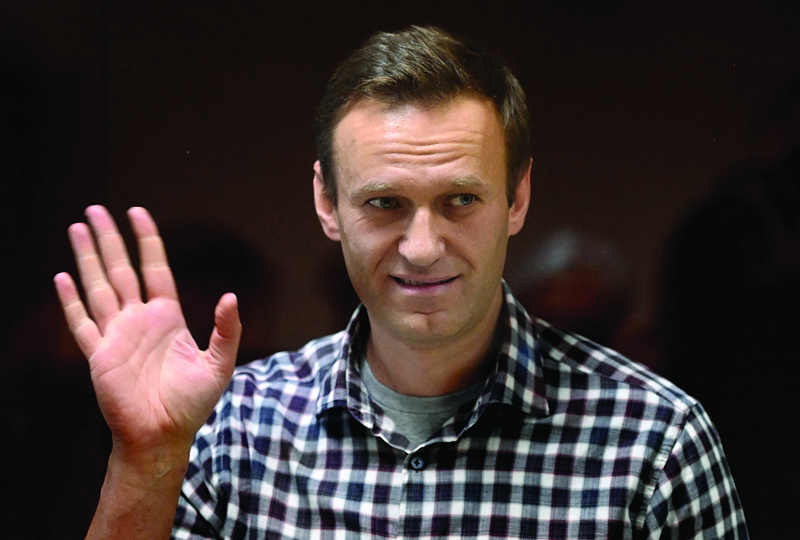WASHINGTON: The United States yesterday warned Russia of "consequences" if the hunger-striking Kremlin critic Alexei Navalny dies in prison, as the opposition politician's team called for mass protests across Russia to help save his life. A day after Navalny's doctors said Vladimir Putin's most prominent critic could die "any minute", US President Joe Biden's national security advisor said Washington had warned the Kremlin that it would be "held accountable by the international community" if he died.
France, Germany and the European Union yesterday joined a growing international chorus of protest at Navalny's plight, and EU foreign ministers will discuss the situation today. Concerns over Navalny's health have mounted against the background of a new spike in tensions between Moscow and the West over a litany of issues, including Russia's troop build-up on Ukraine's border, interference in US elections and other perceived hostile activities. Navalny's team on Sunday called for massive protests across Russia on Wednesday evening, just hours after Putin is set to deliver his state of nation address.
"It's to time to act. We are talking not just about Navalny's freedom but his life," Navalny's right-hand man Leonid Volkov said on Facebook. Volkov said Wednesday's rally could become a decisive battle against "absolute evil" or Russia's last opposition rally for years to come. "Call on all your acquaintances and take to central squares," wrote Volkov, who heads Navalny's regional offices, adding that the protests should be massive.
'Won't be allowed to die'
There was no immediate reaction from the Kremlin but the Russian ambassador in London, Andrei Kelin, said Navalny "will not be allowed to die in prison." "But I can say that Mr Navalny, he behaves like a hooligan," Kelin told the BBC. Authorities have ramped up pressure on Navalny's supporters in recent months, detaining more than 10,000 protesters at opposition demonstrations in January and February.
On Friday, Russian prosecutors asked a court to label Navalny's Anti-Corruption Foundation and the network of his regional offices as "extremist" organizations, in a move that would outlaw them in Russia and could result in jail time for their members or even supporters. Navalny was arrested in January on returning to Russia after recovering from a near-fatal poisoning attack he says was orchestrated by the Kremlin. The Kremlin denies the allegation.
The Putin critic is serving two and a half years on old embezzlement charges-which he says are politically motivated-in a penal colony in the town of Pokrov around 100 kilometers (60 miles) east of Moscow. Navalny began a hunger strike on March 31 to demand proper medical treatment for back pain and numbness in his legs and hands.
On Saturday, Navalny's doctors said his health had rapidly deteriorated and demanded prison officials grant them immediate access. "Our patient can die any minute," cardiologist Yaroslav Ashikhmin said, pointing to Navalny's high potassium levels and saying he should be moved to intensive care. A team of doctors including Navalny's personal doctor Anastasia Vasilyeva made an new attempt yesterday to see Navalny but were not allowed in, they said in a video.
'Totally unfair'
Biden said on Saturday that Navalny's plight was "totally, totally unfair, totally inappropriate". US National Security Advisor Jake Sullivan added on Sunday the Kremlin had been warned "that there will be consequences if Mr Navalny dies." EU foreign policy chief Josep Borrell called Navalny's detention "politically motivated" and said "Russian authorities are responsible for Mr Navalny's safety and health". German Foreign Minister Heiko Maas meanwhile said "we urgently demand that Alexei Navalny receive adequate medical treatment and access to doctors he trusts".
His French counterpart Jean-Yves Le Drian added that the EU was watching Navalny's case and warned of possible further EU sanctions against Russia. Earlier this week Washington slapped new sanctions against Moscow over a massive cyberattack, election meddling and other activities. Navalny's doctors said his blood potassium levels were at 7.1 mmol (millimole) per litre-significantly higher than the 6.0 level which usually requires immediate treatment.
"Alexei is dying," spokeswoman Kira Yarmysh said on Saturday. "With his condition it's a matter of days." More than 70 prominent actors, writers, artists and academics, including Jude Law, Vanessa Redgrave and Benedict Cumberbatch, have called on Putin to ensure that Navalny receives proper treatment immediately. - AFP





